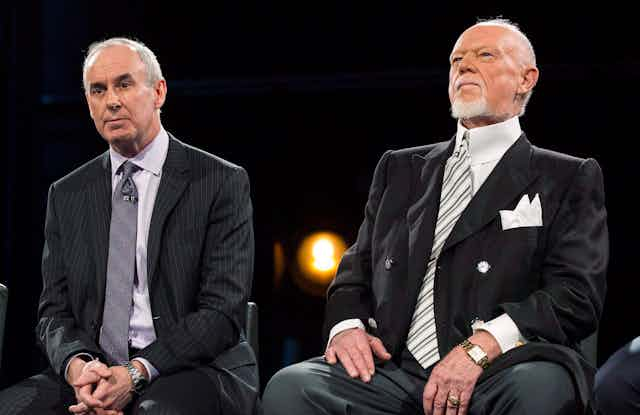The firing of Don Cherry and the ongoing aftermath reveals deep divisions across Canadian society. He has been known for decades as someone who speaks his mind. Some even call him an “icon.”
His recent remark about “you people” resulted in his termination from Sportsnet as long-time co-host of Coach’s Corner. Targeting immigrants and newcomers to Canada, he ranted:
“You people … that come here, whatever, you love our way of life, love our milk and honey … These guys paid for your way of life that you enjoy in Canada.”
Cherry admitted that he should have used the word “everybody” instead of “you people.” Yet the phrase that followed — “that come here” — tells a different story. It leaves little question that his remark took aim at immigrants and newcomers, also made clear in his claim about “our” way of life.
Who is included and excluded in “our?” Far from being an accidental slip of the tongue, “you people” repeats Cherry’s pattern of anti-immigration that goes as far back as 1990.
What Cherry seems to have forgotten is that immigrants and newcomers add significantly to Canada’s economy. In his entitlement to speak freely, he also conveniently neglected to mention that racialized minorities have fought for Canada, as have Indigenous Canadians.
‘Really bad, unexpected thing’
During the first Hockey Night in Canada since Cherry’s removal from Coach’s Corner, Ron MacLean made veiled reference to Cherry’s ignorant and xenophobic remarks and their fallout, calling them “a situation,” adding that “there will be the possibility of this really bad, unexpected thing to do some good thing, I hope.”
Praise for Cherry followed. One wonders why he apologized in the first place if he chose to not spell out the nature of the problem.
Free speech is a cherished principle in Canada and opinions are passionate on whether Cherry’s ouster was was justified or not. But should free speech be unfettered and total, as Cherry’s supporters might suggest?
As one person asked in a “streeter” interview: “What is the point of free speech if you can’t express a view?” Another warned: “It’s getting scary that we can’t say what we want in this country.”
The majority of Canadians believe that political correctness has gone too far. What does that mean?
Entitlement
In the recent past, some people might have felt entitled to make racist, sexist, Islamophobic, transphobic or homophobic statements in their workplaces and, by and large, got away with it. For instance, Cherry once said: “Women in the National Hockey League. I think it’d be great. I think every dressing room should have one.”
In light of the #MeToo and #timesup movements, it’s doubtful that Cherry would have kept his job if he had made such a demeaning remark today. Times changed because minority groups and women pushed back.
In courses that I teach on social justice, the assumption of carte-blanche free speech raises many questions, including: Free speech for whom? Whose free speech is staunchly upheld, and whose is characterized as causing a disturbance?
And who pays for so-called free speech? When a white professor at Western University used the actual n-word in class, it should be of no surprise that such an utterance would come at a cost to students of colour who sat in his classroom at the time. Is it really that the students who objected were “too sensitive?”
Many of Cherry’s supporters similarly mischaracterize the outrage and dismay among racialized minorities when they were marginalized by him in his utterance: “You people … that come here.”
Incite further bigotry
Many Canadians seem to be confused about why people are “so easily offended” at the ignorant or xenophobic remarks of others. Maybe the answer is obvious and lies in the remarks themselves, and that those remarks misrepresent and stereotype marginalized groups of people and incite further bigotry.
Free speech is never free. Minorities and women pay a cost in the form of xenophobic and sexist attitudes and assumptions justified as “free speech.” Cherry misrepresented newcomers to Canada as unpatriotic. Objectively false, the claim holds political power and incites polarization and hostility against racialized people in Canada.

Has it ever occurred to Cherry that part of free speech is the freedom to not wear the poppy? Or that Canadians of all backgrounds might choose other ways to express their patriotism more deeply than a gesture that happens once a year?
What is called for is a reconsideration of “free” speech as a form of responsibility apart from its legal parameters. Such responsibility considers many questions that social justice education can address.
Listen to others
Here are a couple of them:
On what basis do some white people feel entitled to tell people of colour, including those born in Canada, to “go back to where they came from” or to be referred to as “you people”?
How might white Canadians, like myself, respond if Indigenous Peoples were to tell us, en masse, to go back to where we came from?
Maybe Indigenous Canadians are tired of racist comments, attitudes and beliefs among those of us whose ancestors colonized this land and the people who were already on it. Maybe women are tired of still having to deal with subtle and overt sexual harassment in the workplace and post-secondary institutions. Maybe LGBTQ people are tired of homophobic and transphobic slurs, harmful stereotypes, and campaigns that promote hostility and disinformation.
Cherry and his supporters would do well to listen to others and learn from them. Canada would be an even better place for it.
[ Deep knowledge, daily. Sign up for The Conversation’s newsletter. ]

